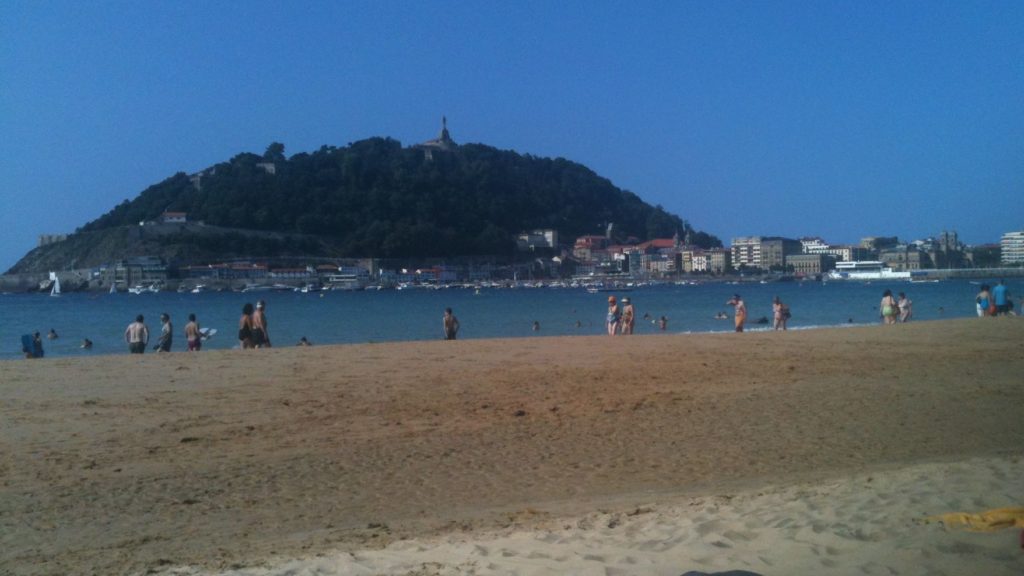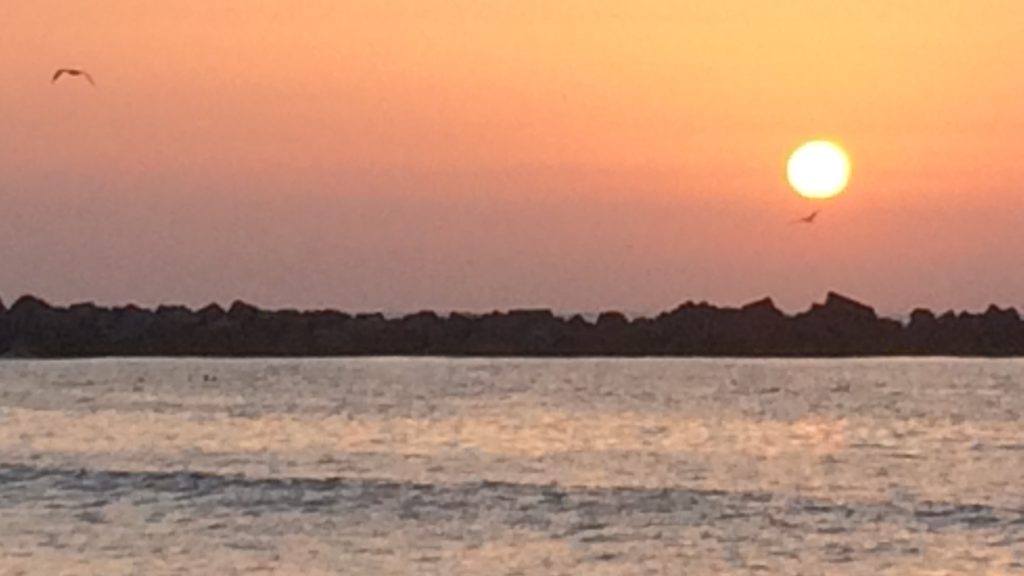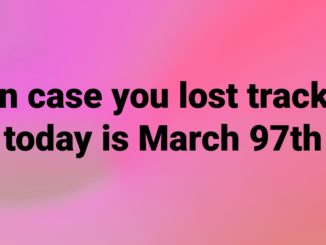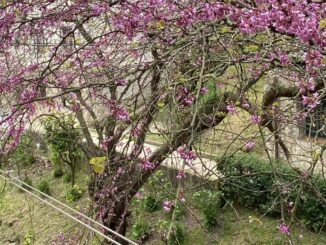One bright summer morning I decide to take my bike and venture down towards the beach. At first I start off slowly, my legs feeling heavy, but soon I pick up speed as I spin down the hill, the wind whipping my hair as I gasp the exhilarating breeze. I pedal hard, skimming fast along the flat terracotta cycle path, changing into fourth gear and gliding under the mottled shade of the leafy university campus.
Once I reach the seafront, I lean my bike against the sea wall and sit to observe the tourists and locals, students, young couples, friends, groups of elderly people and families with children strolling along the promenade. How I envy these people, their relaxed tanned faces, eyes glistening with holiday spirit, careless laughter, as though they haven’t a worry in the world. I ask myself what they are doing here, where they come from and what are the hidden intricacies of their lives.
An elderly couple hobble past, the white-haired husband supporting the bent wife, they are not speaking Spanish, so I infer that they must be locals. A young intertwined couple stride along energetically behind them, the boy gesticulating animatedly and the girl looking deeply into his dark eyes. I muse on how the intimacy of love can be marvellous at whatever age.

After having observed the passers-by for a while, I turn and look out to sea, I can just make out the sound of the rippling water glistening in the sun and the waves smoothly caressing the shore. The island of Santa Clara dominates the wide crescent-shaped bay; it is densely vegetated, peaked with tall conifers bending in the soft breeze and crowned with a white lighthouse sticking out like a stub of chalk, most probably no longer in use. A small blue and white wooden boat chugs backwards and forwards from the mainland bringing picnickers struggling with large baskets to the small quay. I strain to see the people bathing on the rocky shore of the island, their heads barely visible in the murky green water as the waves crash against the craggy rocks.
To the side of the island I fix my eyes on tiny dots in the water, a group of canoeists paddling slowly against the breeze. I see that one of them, a child, has capsized and is bobbing up and down in the water waving, the rest of the group continue and for an instant I imagine how it would feel to be that child’s mother. A wave of panic sweeps over me, would the others notice him and turn back? I look around me as a feeling of bitter anxiety surges within me, constricting my throat and making me thirsty. What can I do? I feel helpless, who can I alert? Luckily, after what seems like an eternity, the child scrambles back into the canoe and rights himself, paddling fiercely to reach the others. My heart returns slowly to its normal beat and I start to breathe steadily again.
From my vantage point I scan the crescent-shaped bay dotted with white yachts and a diving platform from which tanned gangly youths are jumping into the water. On the mainland to the right of the island I can see the small fisherman’s cottages lining the busy wharf. I can just glimpse some men unloading a brightly painted trawler, stacking the fish crates on the side of the quay. I imagine the crates full of seething, jostling spider crabs (“txangurro” as it is known here) ready to be taken away to one of the nearby restaurants and transformed into a culinary delicacy for the tourists. I can almost smell the stench of the fish innards being hosed away by a figure in white overalls and faintly hear the shrill calls of the fishermen’s wives on the quay selling paper cones filled with sea snails to passers by.
The pale sandy beach, speckled with tanned bodies and blue and white umbrellas, gleams in the sun. What strikes me is that streams of people of all ages are promenading along the water’s edge, striding ankle deep at an energetic pace as far as the eye can see. From where I stand above it looks almost like an eel slithering along the bay. Other people splash in the sea and small children build sandcastles in the sloppy sand. A group of teenage girls jog along the shore followed by their overweight coach, puffing and panting behind them. Five elderly men, stretching their sinewy brown bodies, lounge on their sunbeds after braving their daily dip in the chilly waters of the Atlantic. The canoeists I saw earlier are tiredly dragging their canoes up onto the sand, I try to pick out the little child who I saw capsize, but can’t see him, they all look the same to me.
After a while I decide to stretch out on the sea wall and watch a pair of seagulls gliding across the clear azure sky, their faint cries being carried away by the breeze.
I can taste the salty spray from the rocks below on the tip of my tongue. My eyes start to droop, the heat burning my eyelids and cheekbones and I concentrate on the mottled shapes dotting the inside of my eyelids, my heartbeat slowing down, the sounds of nearby voices fading into the distance.
Suddenly I wake up shivering from my deep slumber and catch sight of the golden sun disappearing behind the island, a cool wind whips up the waves like a meringue. People are gathering up their belongings and lazily climbing up the steps from the beach, a man silently folds up the beach umbrellas and deck chairs for the next day. I realise that my silent day of luxury is over, away from the routine of office work and household chores, the chatter of other people, senseless TV and constant drawl of traffic, and I know that at last it’s time to go home.

Author’s Note:
One of the things that has kept my spirits up during this long confinement are my memories of summer here in San Sebastian. Outdoor pursuits, whether it be walking, running or water sports, are so important to the residents of our city and engrained into our lives. I comfort myself by knowing that, in the not too distant future, all of us will once again be able to hear the crash of the waves, feel the fine sand on our toes and vigorously breathe in the clear sea air. I wrote this piece for a writing course I did in 2004 and have returned to it a few times in the last few weeks for solace.


